Suchergebnisse für "Factsheet: Energietechnologien gestalten, die für alle sinnvoll und nutzbar sind"
Thermisch optimierte Balkonsanierung (THERM-opti-BALKON)
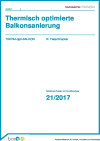
Bei der thermischen Sanierung von Gebäuden stellen frei auskragende Balkone ein besonderes Problem dar. Das Projekt hatte zum Ziel, die Grundlagen für die Entwicklung eines praxistauglichen und kostengünstigen Befestigungssystems zu schaffen, das die thermisch entkoppelte Wiedererrichtung der Balkone im Zuge der Sanierung erlaubt und damit die Effizienz der Wärmedämmmaßnahme deutlich verbessert.
Schriftenreihe
21/2017
N. Fleischhacker Berichte
Deutsch, 59 Seiten
Downloads zur Publikation
Kooperatives Wohnen Volkersdorf – Suffizienz, Flächen sparen und Energieeffizienz im Areal (KooWo - Volkersdorf)
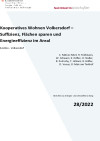
Am Beispiel des gemeinschaftlich geplanten Wohnprojekts „KooWo“ in Volkersdorf soll Suffizienz umgesetzt und das übergeordnete Ziel einer ganzheitlichen Energie- und CO2-Reduktion erreicht werden. Das Wohnprojekt verschiebt die Systemgrenze von einer nutzflächenbezogenen zu einer personen- und Sozialgemeinschaft-bezogenen Betrachtungsweise und generiert durch einen kollektiven Lebensraum Einsparungspotentiale beim Ressourcenverbrauch pro Kopf.
Schriftenreihe
28/2022
C. Falkner-Merl, H. Feldmann, W. Schwarz, K. Höfler, H. Staller, R. Pertschy, T. Urbanz, R. Höfler, D. Venus, O. Mair am Tinkhof
Herausgeber: BMK
Deutsch, 84 Seiten
Downloads zur Publikation
Bestand optimal nutzen - Sanierung energieeffizient implementieren! (BONSEI!)
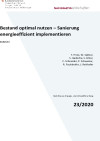
Das Projekt BONSEI! möchte eine energetisch effiziente und sozial verträgliche Nachverdichtung in städtischen Wohngebäuden in Privateigentum fördern und zugleich eine methodische Grundlage für ressourceneffizientere Stadtregionen schaffen. Die Ergebnisse fließen in die Konzeption eines neuartigen Dienstleistungsangebots ein, das als neutrale Erstberatung bei privaten Verdichtungsvorhaben dienen soll.
Schriftenreihe
23/2020
T. Prinz, W. Spitzer, S. Gadocha, S. Erber, C. Schneider, P. Schweizer, R. Fuchshofer, J. Reithofer
Herausgeber: BMK
Deutsch, 77 Seiten
Downloads zur Publikation
MehrWertStrom 2030 - PV-Gemeinschaftsanlagen: Sondierung eines partizipativen Pilotprojekts mit Mehrwert in strukturschwachen Städten
Das Projekt MehrWertStrom 2030 untersuchte die rechtliche, technische, organisatorische und wirtschaftliche Machbarkeit von PV-Gemeinschaftsanlagen auf Mehrparteienhäusern unter Bezugnahme der regionalen Wertschöpfung in strukturschwachen Regionen und erarbeitete neue Lösungsmodelle in Bezug auf Organisation, Finanzierung und Realisierung.
R-Bau - Entwicklung einer praxisorientierten replizierbaren Rückbaustrategie zur Forcierung des verwertungsorientierten Rückbaus im Wohnbau
Ziel des Projekts 'R-Bau" war es, unter Einbindung der relevanten Stakeholder, eine replizierbare Rückbaustrategie zur Forcierung des verwertungsorientierten Rückbaus im Wohnbau zu entwickeln. Schwerpunkte des Projekts waren die Erstellung von repräsentativen Gebäudemodellen und die Erarbeitung eines Rückbaukatalogs mit differenzierten Handlungsanweisungen. Die gewonnenen Erkenntnisse sollen auf Entwurf, Planung und Errichtung von neuen Wohnbauten angewendet werden.
EnerPHit-Grünkonzept - Modernisierung eines Gründerzeitgebäudes mit Anwendung eines Aerogel-Dämmputzes
In diesem Demonstrationsvorhaben wurde eine umfassende Modernisierung im gründerzeitlichen Gebäudebestand beispielgebend für die Randbedingungen einer regionalen Schutzzone umgesetzt. Durch die Anwendung des Aerogel- Hochleistungsdämmputzes wurde eine gründerzeitliche Fassadendämmung im Rahmen einer hocheffizienten, umfassenden Sanierung bei gleichzeitiger Erhaltung des Fassadenbildes umgesetzt.
Entwicklung einer praxisorientierten replizierbaren Rückbaustrategie zur Forcierung des verwertungsorientierten Rückbaus (R-Bau)
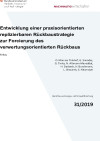
Ziel des Projekts "R-Bau" war es, unter Einbindung der relevanten Stakeholder, eine replizierbare Rückbaustrategie zur Forcierung des verwertungsorientierten Rückbaus im Wohnbau zu entwickeln. Schwerpunkte des Projekts waren die Erstellung von repräsentativen Gebäudemodellen und die Erarbeitung eines Rückbaukatalogs mit differenzierten Handlungsanweisungen. Die gewonnenen Erkenntnisse sollen auf Entwurf, Planung und Errichtung von neuen Wohnbauten angewendet werden.
Schriftenreihe
31/2019
O. Mair am Tinkhof, G. Simader, G. Trnka, N. Altmann-Mavaddat, H. Daxbeck, H. Buschmann, L. Brauneis, S. Neumayer
Herausgeber: BMVIT
Deutsch, 49 Seiten
Downloads zur Publikation
PV-Gemeinschaftsanlagen: Sondierung eines partizipativen Pilotprojekts mit Mehrwert in strukturschwachen Städten (MehrWertStrom 2030)
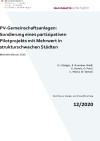
Das Projekt MehrWertStrom 2030 untersuchte die rechtliche, technische, organisatorische und wirtschaftliche Machbarkeit von PV-Gemeinschaftsanlagen auf Mehrparteienhäusern unter Bezugnahme der regionalen Wertschöpfung in strukturschwachen Regionen und erarbeitete neue Lösungsmodelle in Bezug auf Organisation, Finanzierung und Realisierung.
Schriftenreihe
12/2020
O. Schlager, R. Brandner-Weiß, G. Heneis, O. Percl, C. Plöchl, W. Wetzer
Deutsch, 69 Seiten
Downloads zur Publikation
Optimierung der SOLARenergienutzung in URbanen Energiesystemen (URSOLAR)
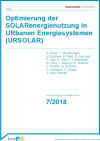
URSOLAR stellt EntscheidungsträgerInnen eine Roadmap zur integrierten urbanen Solarenergie-nutzung zur Verfügung. Es wird aufgezeigt, wie Photovoltaik (PV) und Solarthermie angepasst an infrastrukturelle und rechtliche Gegebenheiten in idealtypischen Stadtquartieren aus ökonomischer, ökologischer und sozialer Sicht sowie unter Berücksichtig von Stakeholder-Interessen optimal ge-nutzt werden können.
Schriftenreihe
7/2018
A. Posch, T. Brudermann, M. Buchner, E. Fleiß, D. Geringer, P. Hart, S. Hatzl, T. Kallsperger, G. Lang, T. Mayrold, E. Meißner, C. Reischl, G. Schnedl, S. Seebauer, K. Stöger, A. Würz-Stalder
Herausgeber: BMVIT
Deutsch, 137 Seiten
Downloads zur Publikation
SolCalc: Development of a standardized calculation algorithm for the energy consumption assessment and the energy certification of residential buildings with a solar fraction of up to 100% in combination with biomass boilers and heat pumps
Development of a standardized calculation algorithm for the energy consumption assessment and the energy certification of residential buildings with a solar fraction of up to 100% in combination with biomass boilers and heat pumps
The Box - Thermal High Performance Decoupling - Next Generation Thermal Break Technology
The project pursues the overall strategic objective "solution of the problem-inducing heat bridge". For this purpose, the thermal bridging losses should be reduced by the factor of 15 in contrast to the state of the art. The significant increase in efficiency should rely on existing system solutions, but incorporating a new holistic view in terms of construction, geometry and materials.
Cooperative Living Volkersdorf (KooWo - Volkersdorf) - sufficiency, space and energy efficiency in the quarter
The jointly planned demonstration project "KooWo" in Volkersdorf aims at reaching sufficiency as well as energy and CO2 reductions in a holistic way. System boundaries are shifted in order not to look only at energy consumption in buildings, relating to unit of floor space, but to consider all use of resources and relating it to persons and social communities.
Housing 4.0 - digital platform for affordable living
The main aim of this project is the development of an integrated framework for the digital platform "Housing 4.0"; thus supporting integrated planning and project delivery through coupling various digital tools and databases. Thereby, the potentials of BIM for modular, off-site housing assembly in order to improve planning and construction processes, reduce cost and construction time and allow for mass customization will be explored. The novel approach in this project is user-involvement; which has been neglected in recent national and international projects on off-site, modular construction, supported by digital technologies.
Indicators for urban areas – for construction, operation and mobility in climate-friendly areas
Development and coordination of indicators for energy and ecological evaluations of urban areas based on the Swiss 2000-Watt certification system. The results will be used for the development of a quality assurance system for urban areas similar to the klimaaktiv declaration for buildings and the e5 certification for communities.
MehrWertStrom 2030 - PV-Community system - Exploring a participatory pilot project with regional added value for structurally weak regions
The "MehrWertStrom 2030" project analysed the legal, technical, organizational and economic feasibility of PV community joint venture facilities on multi-party buildings including the added value for structurally weak regions and developed innovative solutions related to organization, financing and realization.
Future Quarter - Way to an energy-plus quarter in Vienna
Development of transferable concepts for energy-plus quarters as substantial preparatory work for the implementation of an energy showcase quarter in Vienna based on six concrete areas. The support for the broad application of the concept shall be a precursor for the realisation of future energy showcase quarters in Vienna and other cities.
EnerPHit-green concept Modernisation of a historic building with application of an aerogel insulation plaster
This demonstration project shows the comprehensive modernization of a historic building within the constraints of a regional protection zone. By using the Aerogel high-performance insulating plaster, a comprehensive energy-efficient building refurbishment had been realized without changing the outer appearance of the façade.
KoPro Lzk+ - Cost and process optimization in the life cycle of nearly zero energy buildings
The aim of the project was to develop a continuous process chain for the energetic-economic optimization of zero and plus energy buildings. The project focused on proven and new approaches to cost reduction of nearly zero energy buildings (nZEBs) at all stages of the life cycle. The main goal was to identify the extra-costs for nZEBs, and to promote innovative approaches taking into account the cost-effectiveness for all the Stakeholders. A database containing important cost parameters and potential savings will be developed.
R-Bau - Development of a replicable deconstruction strategy for residential buildings to force the recovery-oriented dismantling
The aim of the project was to develop a replicable deconstruction strategy for residential buildings to force the recovery-oriented dismantling. The key aspects of the project are the development of standardized building models in order to analyse the recovery-oriented dismantling process, the design of a deconstruction catalogue and the transfer of the project findings to refurbishment, design and erecting of residential buildings.
SaLüH! Renovation of multi-family houses with small apartments, low-cost technical solutions for ventilation, heating and hot water
New innovative concepts for heating and ventilation were investigated. Very compact heat pumps are developed in such a way that it will be possible to integrate these units into the window parapet or into a prefabricated timber façade.
